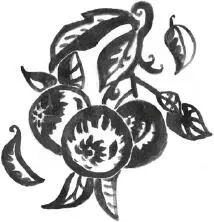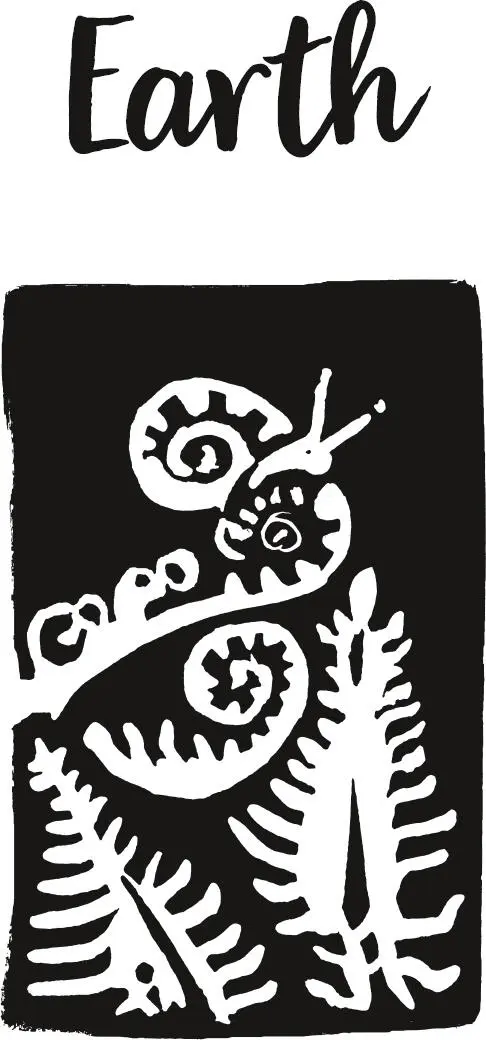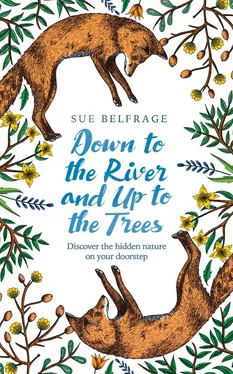When you do venture out and about in the natural world, please keep your wits about you and respect the environment. Be mindful that, as the poet Tennyson said, nature can be ‘red in tooth and claw’. If you go walking and don’t want to get lost, take a map (and keep a wary eye out for cows – more people are killed by cattle in the UK than tigers, that’s for sure). If you want to try wild swimming, check that you can get out of the water as easily as you can hop in. While some of the suggestions in this book might seem a little like child’s play, the intention isn’t to treat nature like a recreation ground, without any thought for other animals, plants and people; it’s about rediscovering the playful sense of curiosity and calm wonder that spending time in nature can nurture.
This journal isn’t a spotter’s guide and won’t, for example, tell you the weight of a robin’s egg or give you the Latin name of the common frog. If, however, your curiosity is piqued, perhaps you’ll go on to do a bit of research of your own. You might like to record your findings, whatever shape they take, in a notebook. And who knows what that might be – scientific insights, lines of poetry or quick sketches of things that catch your eye?
This much I can tell you: there’s a whole beautiful wild world out there, right on your doorstep, just waiting to be discovered. And it’s time to make yourself truly at home in it.


The Earth is our home in the solar system, and the soil beneath our feet. If you ever feel disconnected from your surroundings, go outside and stand barefoot for a moment or two, take a couple of deep breaths and focus on the uneven surface under your soles and toes. If you’d prefer to ground yourself by getting your hands dirty, try foraging for wild foods or consider growing your own. Perhaps build a wormery. Or walk somewhere new that leads you into the past.
Create a sense of rootedness and belonging wherever you find yourself by familiarising yourself with the smells, sights and tastes that surround you. Discover the plants that thrive against the odds and hidden wildlife.
Welcome yourself back to where you belong.

‘Live in each season as it passes; breathe the air, drink the drink, taste the fruit, and resign yourself to the influence of the earth.’
HENRY DAVID THOREAU (1817–1862), Walden
Choose a place that you can visit easily. It could be your garden or balcony, an allotment or stretch of hedgerow, perhaps a park bench or even the corner of a car park. Somewhere you can go and sit or stand without being disturbed for a few minutes; turning off your phone will help. Don’t worry about being stared at; most people are too busy with their own stuff to notice if you sit quietly. (Of course, if you do want others to give you a wide berth, you could try singing the national anthem at the top of your voice; that should work.)
Mark out an area that’s about 1 metre, or an arm span, square. Think of it as a pillar that stretches from the ground up into the sky. Now focus.
 What can you see?
What can you see?
 What do you hear, smell or sense?
What do you hear, smell or sense?
 Is there anything in particular that delights you?
Is there anything in particular that delights you?
 Or is there anything that disgusts you?
Or is there anything that disgusts you?
 How does the air feel on your skin, on your face, ears and hands?
How does the air feel on your skin, on your face, ears and hands?
 Can you hear bird calls or the sounds of animals?
Can you hear bird calls or the sounds of animals?
 What insects are crawling or flying around you?
What insects are crawling or flying around you?
 What other creatures might have passed this way?
What other creatures might have passed this way?
 What difference do you make, being here now?
What difference do you make, being here now?
 And what difference might you make, without disturbing the habitat of any creatures that live here? Could you tend to the plot in some way, perhaps by clearing away litter?
And what difference might you make, without disturbing the habitat of any creatures that live here? Could you tend to the plot in some way, perhaps by clearing away litter?
 Repeat to yourself: ‘I belong here.’
Repeat to yourself: ‘I belong here.’
 You are part of it all.
You are part of it all.
If you like, why not return here once a day or once a week for a month? Make a note of your changing observations as time passes.

‘Come forth into the light of things,
Let Nature be your teacher.’
William Wordsworth (1770–1850), ‘The Tables Turned’
If you’re ever out and about, and come across a spot used by a fox to scent-mark its territory, you’ll find the odour hard to ignore: so strong and musky, it can often be smelt even if you’re driving past in a car with the windows shut.
There’s a particular corner in the middle of the village where I live that always smells of fox. Mind you, the village as a whole often smells of muck-spreading and cows, so there are probably people who crinkle their noses at the entire place as they drive past. I guess I don’t notice the whiff as much as visitors do; it’s just what I’m used to. But I don’t think we should underestimate the power of smell when it comes to making sense of our surroundings, or how important smell is in stoking our impressions and memories of a place.
Here’s a suggestion. On a warm day, when scents are likely to be strong, or after a shower of rain, why not tune into your sense of smell and make an olfactory map? You can do this either on foot, scribbling down notes as you go, or, if travelling by some other means, maybe on a sketch when you get home. What strikes you? Which smells are familiar and which are unexpected? Pungent or pleasing? Plant, animal or mineral?
Читать дальше




 What can you see?
What can you see?










